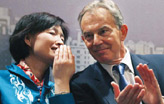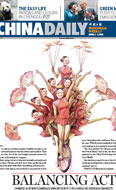Economy
No zero-sum game in growth: Summers
Updated: 2011-03-25 08:16
By Chen Weihua (China Daily)
NEW YORK - Larry Summers, the former director of the White House National Economic Council for President Barack Obama, cautioned against protectionism and said nations must move "past the idea that the prosperity of one country is a threat to the prosperity of others".
| ||||
"It is true that a major threat to Pepsi's superiority, in Pepsi's position, is the success of the Coca-Cola Company. It is true that a threat to the American automobile industry has been the success of the Japanese automobile industry. It is not true that the prosperity and growth of one country has a major deleterious effect on the growth of another," Summers said at an Asia Society meeting in New York on Wednesday.
He said the emerging markets of Asia were customers of US products as well as suppliers for its producers.
"When your customers get richer, your opportunities improve. When your suppliers become more cost-efficient and are able to produce high-quality goods, your prosperity improves," said Summers, who was also treasury secretary in the Clinton administration and served as chief economist at the World Bank.
While acknowledging that some companies within emerging markets will compete with companies in the United States, he said "that is only one of the many interactions that are relevant".
"Think of the rise of Europe. Would anyone seriously suggest that the successful reconstruction of Europe after the Second World War impoverished the United States? Is it reasonable to assume that the rise of the south within the US made the area where I live, Northeast New England, poor?
"We need to move past the idea that the prosperity of one country is a threat to the prosperity of others. That is the seductive and potentially misleading aspect of the word competitiveness."
Kathleen Stephansen, managing director and head of economic strategy at AIG Asset Management, also cautioned against protectionist sentiments. She said that the Chinese currency issue has been blown out of proportion.
"When you look at the (renminbi's) impact on the growth of US exports, it's very small. It might have (had a) negative effect, but on the other hand it has a positive impact in providing cheap credit," she said.
Summers marveled at the rapid growth of Asia, in particular China, where living standards have doubled in eight or nine years. He said that it took a generation in the US for that to happen around the turn of the 20th century when the US economy grew rapidly.
He suggested that if the history of this era was written 200 years from now, the end of the Cold War will be a subplot. The most important story will be how this enormous forward thrust in Asia ends up.
Summers said he hoped that nations would come together, and would compete and cooperate to produce greater prosperity and security for all citizens while respecting environmental imperatives.
He advised that countries should work to maximize the likelihood of that favorable outcome. He also said he hoped that the rapid growth of Asia would help spur a renewal in the US, similar to the impact that German and Japanese economic success had on the US economy in the 1990s.
Top of the US agenda should be addressing debts, the profound federal deficit, infrastructure deficits and a deficit in the creation of human capital, such as in the education system.
"If we are able to do this, I believe we can redeem the promise of this moment. I believe a stronger and vital United States can make an important contribution in the future as in the past to a healthy global economy," he said.
Summers said that if the US maintains an outward looking spirit, it is likely to become more able to respond to all kinds of unexpected shocks that are certain to come.
Bill Rhodes, president and CEO of William R Rhodes Global Advisors, LLC, suggests that the key to fighting protectionism is to ensure sustained growth.
"If you sustain growth, you bring down barriers. Otherwise you see protectionism and other mentalities."
E-paper

Green mission
Tony blair believes China will take a leading role to fight climate change and cut emissions.
Stepping on to success
French connection
Generation gaps
Specials

Have you any wool?
The new stars of Chinese animation are edging out old childhood icons like Mickey Mouse and Hello Kitty.

Fill dad's shoes
Daughter and son are beginning to take over the family business of making shoes.

Virtual memorial
High-Tech touches to traditional tombsweeping festival help environment.




